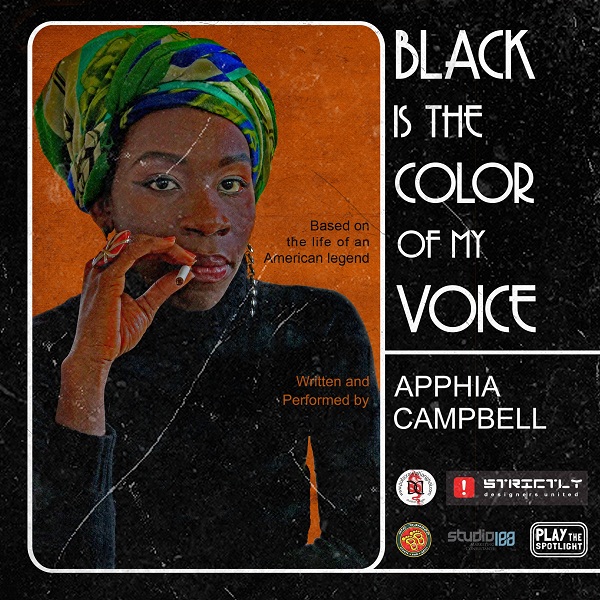 Written and performed by Apphia Campbell and directed by Arran Hawkins, “Black Is The Color of My Voice” draws its inspiration from life and career of the singer Nina Simone. Hearing the story of a young African American woman with a talent for music and a dream to become a concert pianist, the audience meets a compelling character who charges them with energy and optimism, drives the action forward and makes the play as endearing as it is insightful.
Written and performed by Apphia Campbell and directed by Arran Hawkins, “Black Is The Color of My Voice” draws its inspiration from life and career of the singer Nina Simone. Hearing the story of a young African American woman with a talent for music and a dream to become a concert pianist, the audience meets a compelling character who charges them with energy and optimism, drives the action forward and makes the play as endearing as it is insightful.
The plot relies heavily on flashbacks. Trying to cope with her father’s death, the protagonist, Eugena Williams, also known as the singer Mena Bordeux, travels to Liberia to perform a cleansing ritual. She is to spend three days in solitude, with no alcohol, cigarettes, or communication with the outside world in order to “face the past and move on to the future.†All of the action takes place within one room with a bed, an unplugged phone and a suitcase with such memorable items from the character’s childhood and adolescence as her first concert dress, the hats her mother and she wore on special occasions, love letters and other sentimental trifles. Pulling out one object after another, the protagonist addresses her father, recalling her biggest joys and disappointments.
As she talks to the picture of her dad, it turns out that Eugena regrets quite a few things in her past, especially not speaking to her father for 14 months prior to his death and letting the love of her life walk away from her and marry another woman. Shedding her memories, she manages to control her anger and resist the tempting cigarettes, resting on her night table, as well as the voices outside. Lively and cheerful by nature, Eugena presents her saddest experiences with a smile instead of allowing them to weigh her down.
“How can she be so strong?†one can wonder. Eugena’s secret lies in music. Not only does it constitute Eugena’s life and passion; it also helps her heal. When she remembers something, we often hear the tunes in her head she connects with her experience, as we all do at times.
In addition to having an impact on her own life, Eugena’s music influences others as well. Her records were confiscated during the raids of the civil rights movement activists. She has been the voice of the resistance, the non-violent rebel her father had wanted her to be.
Although Campbell does talk a lot about racial prejudice in pre- and post-Martin-Luther-King America, she does not let the discrimination issues overwhelm her work. Eugena’s life and passion for music remain the main focus of the play, so any audience member can relate to the protagonist, regardless of his or her race or cultural background. At the same time, Eugena takes pride in who she is, and this wins her the audience’s respect.
Since the scenery does not change at all, it is up to Campbell to drive the action forward, and her expressive face and shrill laughter manages to keep the audience’s attention. Campbell’s Eugena mimics her mother in a funny and loving way. She has the ability to laugh at herself, and her laughter sets the audience at ease. They begin feeling as though they have known the protagonist intimately for many years, as they learn her story, little by little, through her monologue.
Only the scene of her abuse seems over-dramatized, and it appears out of character that such a strong woman would want the person who mistreated her in all those ways to be her husband. Although the Eugena we see on the stage would not, the younger, more naïve and inexperienced version of her did not even tell her father what happened to her. As the protagonist says, “I wish we could erase all the things we have done from our minds.†But instead of wishing for the impossible, we all need to let the past go and cleanse ourselves in preparation for the future. That’s one valuable lesson the play teaches us.
And for that reason, sponging in the protagonist’s final notes, we cannot help but smile, feeling empowered and positively charged. If there were only one thing for us to carry out from the show, it would be “know who you are and be that person,†no matter what challenges life has in store for us.

Leave a Reply